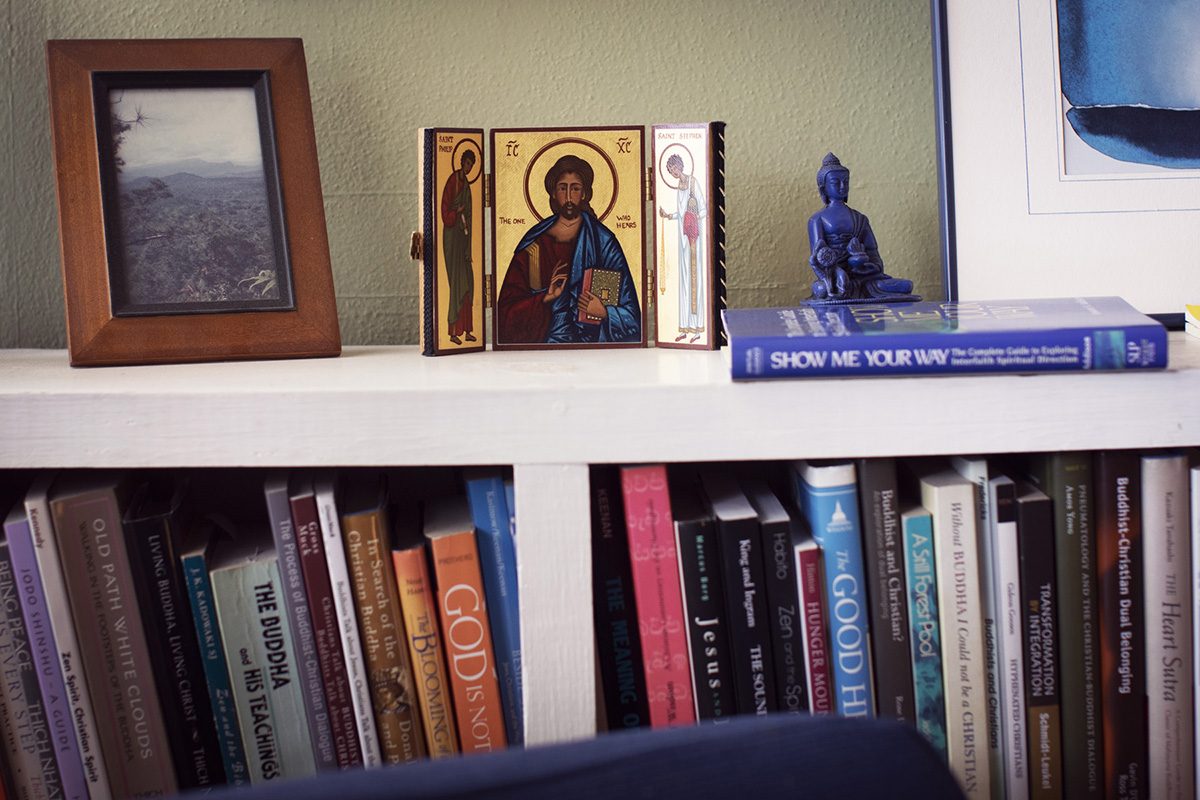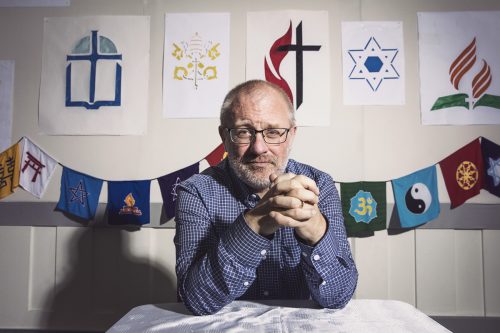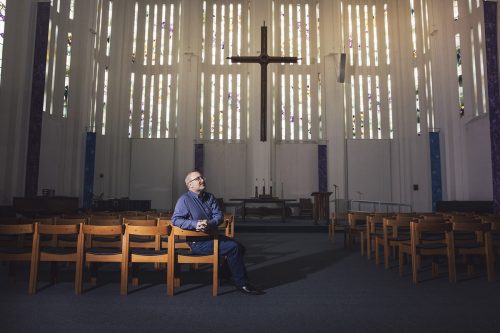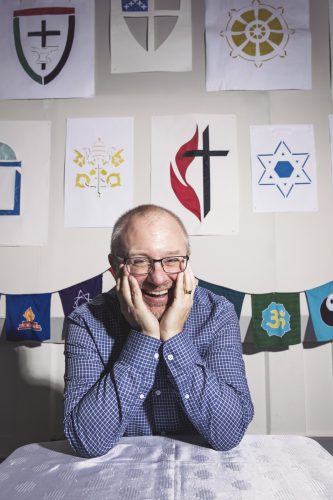
Photo by Christina Gandolfo
Duane Bidwell and the Complexity of an Interreligious World
Through his teaching and writing, the professor at Claremont School of Theology affirms the fluidity of religion.
When Duane Bidwell ’88 was serving as a Christian chaplain at a hospital in Dallas, he was summoned to the room of a dying Vietnamese man. Bidwell arrived, Bible in hand, ready to pray with the family.

Duane Bidwell is a professor at Claremont School of Theology. Photo by Christina Gandolfo
But the man’s relatives didn’t understand why Bidwell was there. A hospital chaplain praying with the family of a dying person was not part of their religious expression. The man’s young son, who had been born in the United States, thanked Bidwell but said the family was Buddhist.
Bidwell immediately began chanting in Pali, the language of the Theravada Buddhist scriptures, and in response, the family members began to pray in a manner that was authentic to their practice.
Bidwell, a Presbyterian minister and Buddhist practitioner, is familiar with the challenges and rewards of having multiple religious identities. In his book When One Religion Isn’t Enough: The Lives of Spiritually Fluid People (Beacon Press, 2018), Bidwell wrote about people who said their multiple religious bonds can unsettle friends and family who assume a person can claim only one religion. But Bidwell said the spiritually fluid are an asset to society.
“We’re at a point in American culture when people talk about how polarized we are,” Bidwell said. “It’s a certain type of ideology that draws lines about who’s inside and who’s outside. I wanted the book to help us expand beyond the simplistic, reductionist dialogue about ‘Christians believe that, Buddhists believe this.’ Life and human experience are complex and messy, and we have to engage the complexity if we’re going to understand each other.”
Bidwell grew up in a blue-collar family in Urbana, Illinois. A full-tuition Chancellor’s Scholarship lured him to TCU. He majored in political science and news-editorial journalism and credits the honors colloquia, particularly courses taught by Walton Rothrock and Don Jackson, with teaching him to think deeply about the “big questions.”
“You have to be able to think critically, but sometimes more important is being curious and having an imagination that lets you enter into other people’s experience.”
Duane Bidwell
“Liberal arts education helped me realize that not everyone was like me and that there are multiple perspectives always at work,” Bidwell said. “In order to understand what’s going on, you have to dig deep enough to identify the commitments, values and loyalties that are behind what people are saying. You have to be able to think critically, but sometimes more important is being curious and having an imagination that lets you enter into other people’s experience.”
Bidwell, who didn’t attend church as a youth, was curious about meditation and took a course on Buddhism with now-emeritus professor of religion Andy Fort.
From there, Bidwell wrote an article about a Buddhist temple in Keller, Texas, as a journalist for the Star-Telegram in Fort Worth. A monk at the temple and Bidwell became friends, and the alumnus visited the monk’s family in Thailand. Bidwell spent much of his time there at Buddhist temples.
Sometime later, Doug Newsom, now professor emerita of the Bob Schieffer College of Communication, connected Bidwell with an Indian colleague who wanted a U.S. reporter to teach journalists in Delhi. Bidwell spent several months there.
He returned to Texas, shaken by the suffering he had seen on visits to quarries where indentured laborers hewed rocks from the ground to build apartments and shopping centers for India’s emerging middle class. “It was like seeing the book of Exodus brought to life.”

Duane Bidwell’s latest book, When One Religion Isn’t Enough, explores the lives of the spiritually fluid. Photo by Christina Gandolfo
Bidwell committed to studying and practicing Buddhism and to pursuing a service-oriented career. He became the first director of the AIDS Interfaith Network for Tarrant County. The network trained volunteers from religious communities in hospice care for people dying of AIDS.
His work introduced him to Christian and Jewish communities “who were willing to say, ‘Caring for dying people is more important than my own fears and my own respectability,’ ” Bidwell said. “That touched me very deeply, and I wanted to learn more about what in their faith motivated them in that way.” He visited Christian churches through AIDS Interfaith and entered the spiritual direction program at Dallas’ Anglican School of Theology. Through these inquiries, he adopted a Christian identity that, like his experience of Buddhism, emphasized contemplative practice.
He earned a master’s degree at Brite Divinity School and became a trauma chaplain resident at Parkland Health & Hospital System in Dallas, an experience he described as “getting a master’s degree in human suffering.” Seeking to build deeper, ongoing relationships with clients, he decided to pursue pastoral counseling instead.
When Bidwell started the ordination process in the Presbyterian Church (U.S.A.), a denominational committee was puzzled by his Buddhist background. He settled on Buddhist-Christian studies as an academic subject rather than openly incorporating his Buddhist identity into his ministry journey.
Bidwell earned a doctorate from Brite and then directed the divinity school’s Pastoral Care and Training Center. Since 2010, he has taught at the Claremont School of Theology, a Southern California graduate school that is affiliated with the United Methodist Church but that takes an ecumenical and interreligious approach to education. As professor of practical theology, spiritual care and counseling, he teaches future chaplains, psychotherapists and ministers who will work with people of many faiths.
One was Monica Sanford, an ordained Buddhist lay minister who serves as the assistant director for spirituality and religious life at the Rochester Institute of Technology. In her quest for an education that would combine Buddhism and pastoral theology — which is difficult to find in the United States — Sanford found Claremont, where she studied under Bidwell and took additional courses at a nearby Buddhist university. Bidwell was open to Sanford incorporating perspectives from multiple religions in a way Bidwell’s graduate instructors had not been.
“Life and human experience are complex and messy, and we have to engage the complexity if we’re going to understand each other.”
Duane Bidwell
“We need more people like Duane who are invested in the unconventional,” Sanford said. “My work would not be possible without people like Duane who are willing to look at someone and say, ‘Well, you don’t fit here, but that doesn’t matter. We’ll take you anyway. And we won’t try to mold you into what we are; we’ll help you find what you are.’ ”
Bidwell is leading the spiritual care field into new, interreligious territory, said Joretta Marshall, a professor of pastoral theology, care and counseling at Brite who co-edited The Formation of Pastoral Counselors: Challenges and Opportunities (Routledge, 2007) with Bidwell.
“In our field, each change in the generations has brought a different perspective,” she said. “I think Duane has very much been at the forefront of [engaging] religious pluralism.”
In 2019, Marshall, then dean at Brite, invited Bidwell to teach the summer course Spiritual Care in the Context of Complex Religious Bonds.
“It was important for me to help our students think about: What does it mean to live in a religiously plural world?” she said. “Not just to understand religious diversity but to engage it in a way that has meaning — and I think he does that in a really intellectually smart way.”

Duane Bidwell, a pastoral theologian, studies spiritual fluidity and how one person can combine and overlap perspectives from multiple religions. Photo by Christina Gandolfo
At Claremont, and in his psychotherapy practice, Bidwell met many people with multiple religions. But he rarely saw their experience represented in the academic literature, which tended to focus on doctrine and history. To fill the gap, Bidwell wrote When One Religion Isn’t Enough, which Library Journal named a best book of 2018 for religion and spirituality.
Bidwell wrote that in the United States, spiritual fluidity often is assumed to be a choice made by a relatively educated, privileged person who dabbles in a new religion. But that perspective overlooks the experience of people around the world who are born into interfaith families, who come from cultures where a colonial power superimposed its religion on the native one or who practice one religion publicly and another privately to avoid persecution.
The U.S. census doesn’t ask about religious affiliation, but Bidwell points to several indicators that spiritual fluidity is becoming more common. Immigration, particularly since 1960, increased the country’s religious diversity, and many immigrants today come from places where religious multiplicity is common.
Surveys by the Pew Research Center’s Forum on Religion & Public Life have shown that a third of U.S. marriages are between partners of different faiths or between a partner who identifies with a religion and one who doesn’t. And a quarter of Americans sometimes attend worship services outside their own tradition.
For Bidwell, an increase in spiritual fluidity is a positive development. He suggests that people who have multiple religious bonds tend to be less rigid and more open-minded in their interactions with people from different backgrounds. “When spiritual fluidity blurs the sharp lines between religious traditions, highlighting how traditions overlap and influence each other … harmful religious norms are more easily dismantled,” he wrote in When One Religion Isn’t Enough. “We are invited to think critically about what we believe and practice.”

Your comments are welcome
4 Comments
A very good article.
One small note, I am wondering if Bidwell is aware that he has the Disciple’s Chalice logo reversed. : )
The St. Andrew’s Cross is on the left side of the cup, instead of the right. Particularly relevent with TCU being one of “our” affiliated schools.
Thank you for the article.
I love how he accepts all people where they are, for we should love our neighbor as we love ourselves, however there is only one way to correct the relationship between God and man and that is through the blood of Jesus. Accepting everyone’s differing views on religion as absolute truth, with a world view such as this, is going to end with them being separated from the only God that truly exists. It may have short term peace, but it ends with separation from our Heavenly Father and is not coming from a Biblical world view. I would hope that in this love he has for others he would be able to show them the love of Jesus and tell them the truth of His sacrifice for our salvation.
In Dr. Duane Bidwell, I find a kindred spirit. Raised a Roman Catholic and having served in the R.C. ministry for 17 years, I was most taken with the mystical / contemplative tradition of Christianity. My reading of Rudolph Otto’s ” The Idea of the Holy”; Theilhard de Chardin’s ” The Divine Milieu” and Trappust monk, Thomas Merton’s books on Christianity & Buddhism (he developed a close friendship with Buddhist monk, Thich Nhat Hanh) led me to explore Buddhism, Hinduism, Taoism. 38 years ago, I left Catholicism and became a Quaker, which allowed me to integrate all of these traditions. I am a spiritual/religious hybrid because the Holy and Eternal One of the Universe(s) is not confined to human created religious or spiritual traditions. We can experience Them in all these traditoons.
Seems odd a Christian school encourages this article. Disappointed. This article embraces multiple religions as somehow healthy. “Fluidity”as you call it, embracing other religions is against biblical scripture. Being kind and accepting to people of all religions yes. But this article is talking about religion. You have to choose. Sorry. You can’t be a hybrid in religion. You say you are “not confined to human created religious or spiritual traditions.”
Christianity IS acknowledging there is one God. The way to Him is through Jesus, no other gods. This is what our Christian faith tells us. Again, is TCU a Christian university or not?
Related reading:
Alumni, Features
Swanee Hunt Pushes for Inclusion of Women in Peace Building
The humanitarian champions women helping their countries recover from war.
Features
Community Scholars Bring New Perspectives
Scholarship program opens up a world of possibilities to North Texas’s underserved elite students.
Features, Research + Discovery
Komla Aggor Traces Trans-Atlantic Slave Trade Through Language
Descendants of African slaves use the Spanish language to understand their history in Latin America.